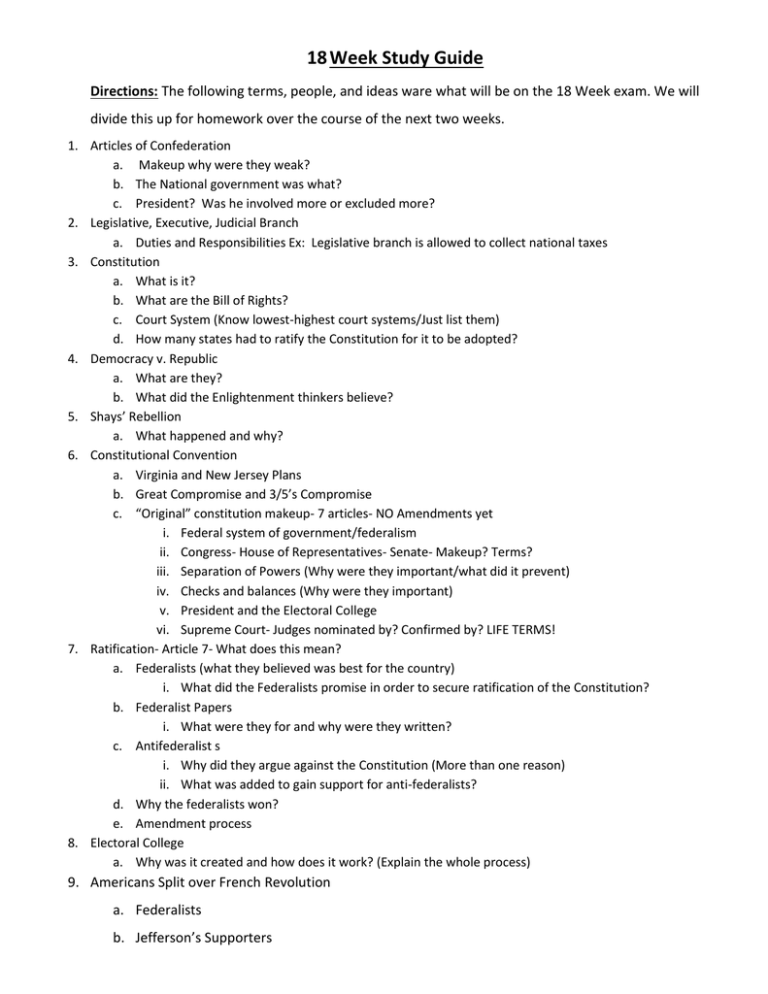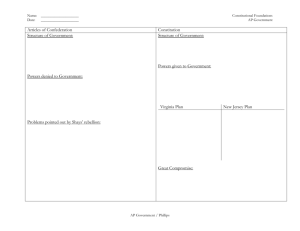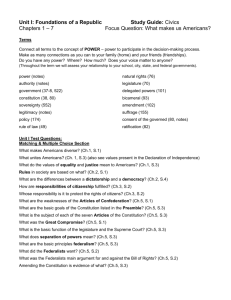Week Study Guide
advertisement

18 Week Study Guide Directions: The following terms, people, and ideas ware what will be on the 18 Week exam. We will divide this up for homework over the course of the next two weeks. 1. Articles of Confederation a. Makeup why were they weak? b. The National government was what? c. President? Was he involved more or excluded more? 2. Legislative, Executive, Judicial Branch a. Duties and Responsibilities Ex: Legislative branch is allowed to collect national taxes 3. Constitution a. What is it? b. What are the Bill of Rights? c. Court System (Know lowest-highest court systems/Just list them) d. How many states had to ratify the Constitution for it to be adopted? 4. Democracy v. Republic a. What are they? b. What did the Enlightenment thinkers believe? 5. Shays’ Rebellion a. What happened and why? 6. Constitutional Convention a. Virginia and New Jersey Plans b. Great Compromise and 3/5’s Compromise c. “Original” constitution makeup- 7 articles- NO Amendments yet i. Federal system of government/federalism ii. Congress- House of Representatives- Senate- Makeup? Terms? iii. Separation of Powers (Why were they important/what did it prevent) iv. Checks and balances (Why were they important) v. President and the Electoral College vi. Supreme Court- Judges nominated by? Confirmed by? LIFE TERMS! 7. Ratification- Article 7- What does this mean? a. Federalists (what they believed was best for the country) i. What did the Federalists promise in order to secure ratification of the Constitution? b. Federalist Papers i. What were they for and why were they written? c. Antifederalist s i. Why did they argue against the Constitution (More than one reason) ii. What was added to gain support for anti-federalists? d. Why the federalists won? e. Amendment process 8. Electoral College a. Why was it created and how does it work? (Explain the whole process) 9. Americans Split over French Revolution a. Federalists b. Jefferson’s Supporters c. Citizen Genet 10. Why did the United States not want to side with either France or Britain? 11. Proclamation of Neutrality 12. Jay’s Treaty: Name everything that came out of this treaty with Britain (There is about 4 different steps) 13. Enumerated/Expressed Powers: 14. Concurrent Powers: 15. Reserved Powers: 16. Inherent Powers: 17. 10th Amendment: 18. Implied Power: 19. Overall platform of Jefferson and Hamilton a. Be able to identify who wanted what. Ex. National bank b. What they supported/opposed about the Constitution? 20. 4 most important powers of Congress 21. Strict vs. Loose Construction 22. Whiskey Rebellion: (What happened, what does Washington do, and what did it show about the American government) 23. The two parties of United States (The Jeffersonians/Republicans and Federalists) a. Name what they believed in and how they were different. 24. Events with Farmers in U.S. 25. What were the precedents that Washington set for almost every president that followed him? 26. Election of 1796 (Who ran, what party did they represent, who won?) 27. Address of 1796: What did Washington say in that address? Why was this wise advice for United States? 28. XYZ Affair: 29. Alien and Sedition Acts (Define) a. What were the effects from the passages of these acts? 30. Virginia and Kentucky Resolutions: 31. Election of 1800: Who ran, what party did they represent, who did they gain/lost support from, what were the results, how was it a peaceful transfer of power 32. Bureaucracy 33. Midnight Judges: 34. Marbury vs. Madison (Define) a. Know everything about the case b. What did Justice John Marshall increase the power of? 35. Judicial Review a. What did it allow federal courts to decide? 36. Land Act of 1800: 37. Napoleon and the French: 38. Louisiana Purchase: 39. Lewis and Clark Expedition: 40. Election of 1804: Who ran, what party did they represent, what were the current events that were discussed in this campaign, what were the results 41. Increasing Tensions with Europe: a. The Chesapeake: b. Embargo of 1807: Open Ended Questions Answer the following question(s) on the back of this paper or on a separate sheet of paper. 1) What key conflicts emerged at the Constitutional Convention? Analyze these conflicts and explain how the framers resolved them. Think About: - conflicts between large state and small states - conflicts between North and South - conflicts between Federalists and Antifederalists - enumerated and reserved powers - separation of powers within the national government 2) Alexander Hamilton and Thomas Jefferson were brilliant advocates of very different visions of what America should be. Compare and contrast their visions. Think About: - the role of a strong central government versus state and local governments - who should play a leading role in government - how best to protect individuals' rights 3) Comparing and Contrasting: How does the Articles of Confederation compare and contrast with the Constitution? Think About: - strengths and weaknesses - distribution of power: state v federal - national government’s ability to carry out its functions 4) To what extent were the U.S. Constitution and Bill of Rights designed to provide a framework for the American system of government, while also protecting individual rights? Think About: - the stated responsibilities within the Preamble - Locke’s social contract Rubric: The Response should include: • A well organized, cohesive and structured response • Introduction and concluding Statements • Clear, concise and relevant examples • Grammar, spelling







